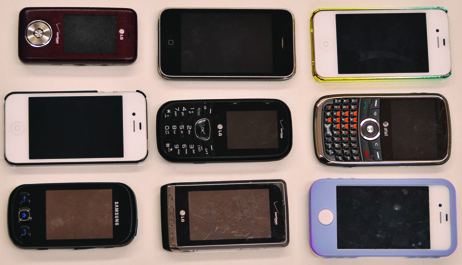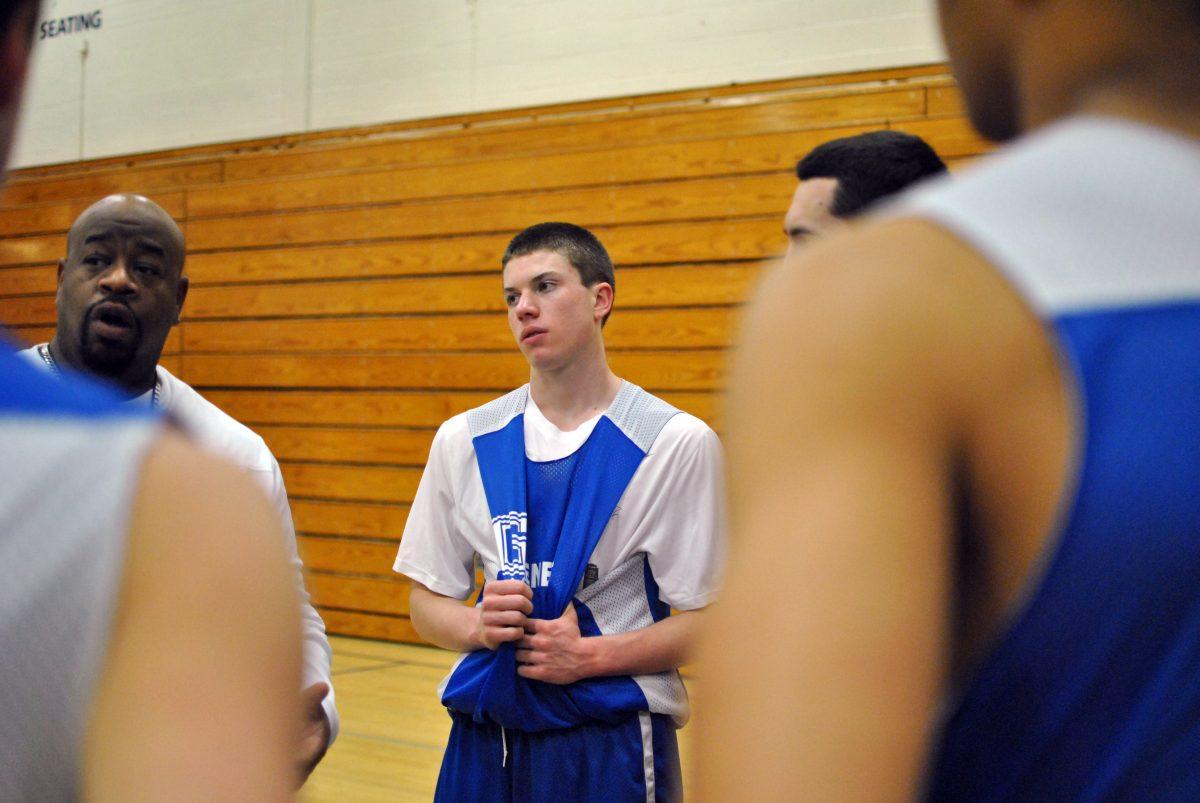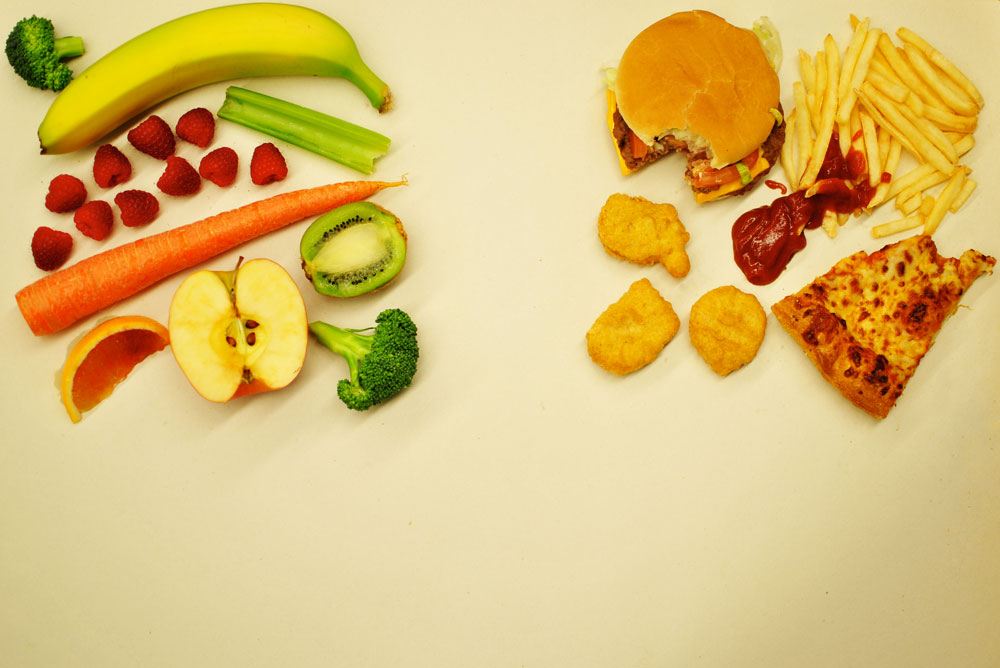Can you remember the last time you didn’t have your cell phone within arms length? Ever go to a restaurant and see that couple sitting together, staring into their cell phones rather than each other’s eyes? How about the weekend party or the get-together with friends where everyone pays more attention to their phones and to posting on Twitter and Instagram rather than to the person standing next to them?
Cell phones have pushed socializing to new limits, changing the way we communicate. But they’ve also created a culture of digital communication that’s become somewhat addictive as students at Grant and beyond become more reliant on the devices.
Portland social worker Michael Parker, who owns a private therapy practice in Portland, says this addiction is unhealthy and can lead to depression and anxiety. “Every time you get a new text from a friend, you are rewarded,” Parker says. “So people get very addicted to those social rewards and check their phones constantly without realizing it. That is bad for your mental health and prevents you from experiencing the moment.”
Parker says he has also seen this addiction lead to relationship problems with friends, family members and couples. He says relationships take time and work, and “when you have that time to be working on building a connection, people shut down and go on their phones.”
Parker’s point doesn’t seem to matter to most people. Lauren Whittman, an AT&T retail sales consultant at Lloyd Center Mall, says: “Cell phone sales have gone up huge. The market has completely expanded.”
For students, phones and computers are important tools in a linked-in society. Grant senior Ian Bowey says social networking sites are a necessity. He posts about three substantial statuses a day on Facebook. “It’s a 21st century diary,” he says. “I like having a place to voice my opinions, my interests, my hobbies, and my feelings in a safe place, where even when someone attacks me it doesn’t hurt the same.”
While students like Bowey believe sites like Facebook are important, teachers, administrators and others agree that students are on phones and social networking sites too much.
Grant math teacher Barbara Riggin says her students often try to multitask in class, checking updates on their phones while also trying to listen to the lesson. Riggin says this is not efficient. “Something will get slighted and it’s normally the educational experience,” she says.
So what if phones and social media went away? Grant Magazine decided to challenge three students. We met with the students and their parents, and the teens agreed to give up their phones and social networking sites for three days. Here are their stories unplugged.
Mikayla Mandic: changing habits
“It feels good,” says Mandic.
It wasn’t always this way. Mandic says she is addicted to her phone. “I am on my phone 24-7,” she says.
Texting, phone calls, Twitter and Instagram keep her going. She knows it’s a problem but it’s hard for her to stop.
“I like going on and seeing what people are saying,” she says. She also plays games on her phone and uses it as a tool for things like directions, weather reports and an alarm clock.
When Mandic first started our experiment, she dreaded the amount of time she would have to go without her phone. “I thought I would have crazy mood swings without it,” she says.
But after the first two days, Mandic found the opposite was true. “Not having to constantly check something or worry about where it is feels like a weight lifted off my shoulders,” she says.
She realized that keeping track of her phone was “stressful,” especially since if she loses another phone it will be “the end of the road.” Emily Mandic has made it clear she will not buy her daughter a fourth iPhone after she lost her previous three.
Mandic felt more alert and realized that there is value in having real conversations. “I get kind of spacey sometimes and I feel like my phone definitely contributes to that,” she says. “I don’t try to ignore people when they’re talking to me, it’s just with my phone it happens.”
On the first day without her phone, Mandic babysat her cousins with a friend. While there, her friend spent most of the evening on her phone. It was too much for Mandic. “She was on hers 24-7 Snapchatting and everything,” Mandic says. “I had to be like, ‘put your phone down.’ I felt jealous and anxious.”
On the following days, Mandic stayed home and watched TV, read magazines, painted her toenails and shopped online. “It wasn’t bad,” she says.
Emily Mandic noticed a difference in her daughter’s behavior. Without her phone Mikayla Mandic “gave a little more time to the family and got more interactive with us,” says Emily Mandic.
Mikayla Mandic says that during the experiment the whole family learned “there’s a time and a place where we shouldn’t have our phones, no matter what the circumstances are and whether or not it’s work related. When you’re around other people, and the point is to be communicating or social, that’s when it’s important to put it away.”
Being without her smartphone for three days was easier than Mikayla Mandic thought it would be. She adds: “If I can do it, anyone can do it.”
Mandic offers caution to Grant students: “Be aware of how much you’re using your phone. I had no idea. I didn’t realize how much I was on it and how much it was affecting my life.”
Bria Grant: safety comes first
It was half time at the Rose Garden last month. The fans sat down after an hour of cheering – the Blazers were winning – and Junior Bria Grant was among them. As she turned to talk to her friends about the game, she saw they were already occupied. But they weren’t talking to each other. They were on their cell phones.
“I felt out of the loop,” Grant says. Only on her second day without her phone, the next day seemed daunting.
As a kid, Grant never understood the need for a cell phone. But once she entered middle school and her peers began comparing phones, she wanted the best phone money could buy. In the sixth grade, she got a Qwest flip phone.
“It was mostly for after school activities” and safety reasons, says her mom, Nia Grant. Her daughter walked to and from school, took the bus and was involved in extracurricular activities. For Nia Grant, communication was a must.
Grant recalls a time in seventh grade when she was walking alone on her way to school. The sun was barely up when she noticed a parked pickup truck nearby. A man sat in the driver’s seat, his eyes focused on her. Grant quickly pulled out her phone. The car engine rumbled and looking back, Grant saw the man still staring at her.
“I felt like he was coming closer,” Grant says. “I was kind of scared but I remembered that I had my phone.” She dialed her mom’s number without hesitation. The man and his truck disappeared as her mother pulled up.
Nia Grant says that although her daughter’s phone was put to good use, when Bria Grant first got her cell phone she talked non-stop. “She would gabba gabba gabba all the time on the phone,” Nia Grant says. But when her daughter entered high school, she quickly became a fan of texting.
So going three days without a phone made Grant feel uneasy. But she used her free time to shop with her cousin, watch TV, study and play basketball.
“Overall I think I learned how to use my time a lot more wisely,” Grant says. “Instead of me just being on my phone all day and night, I started to realize how much more time I could spend with people and enjoy life in general.”
Last year, Grant decided to get rid of her Facebook account and focus more on her grades. “Facebook was all drama,” she says. But she couldn’t bear to give up texting.
The first day of our experiment, she started feeling withdrawals. “I thought about it so much,” Grant says. “I felt lost without it.”
Checking empty pockets, searching classroom desks, it was hard to break the routine. “On the third day I started to get used to it, but I still thought about it a lot,” Grant says.
Without her phone, Grant slept better and participated more in school. “I was a little more active in the classroom,” Grant says. She buckled down for an upcoming science test and for the first time, she studied without any texting breaks.
After separating from her phone and the Internet, Grant says she wants to use her phone less in the future. Both Grant and her mother believe having a phone is a necessity, but excessively using it isn’t. “It’s a waste of our personal lives just sitting on our phones all day,” Grant says.
Addison Loda: communicating face to face
Addison Loda sits beofre his computer at his desk, engrossed in his favorite video game, Minecraft. While one hand controls the mouse, his other hand reaches into his pants pocket, searching for his phone. It’s a habit. “It helps take my mind off things,” says Loda. “It calms me.”
Some people twirl their hair. Some tap their feet. Grant freshman Loda, 15, usually flips his flip phone open and closed.
This time, though, his hand came up empty as he remembered he didn’t have his phone. It was his first day without it in our experiment and he hardly noticed a difference. “I just went back to what I was doing,” says Loda.
Loda got his first phone in second grade. Every day, he walked four blocks home from school, so his father, Peter Loda, wanted his son to have a way to contact him. Peter Loda says: “It felt like the normal thing to do. You don’t feel safe without a phone, you have to be in contact almost every hour. ”
Today, Addison Loda only uses his phone occasionally. “I’m not pulling it out in class or constantly checking it, but it would be hard to stay in contact with people without it,” he says.
During the three days without his phone and social networking sites, Loda spent more time outside taking his pitbull-labrador mix, Alex, out for longer walks. Loda says: “I was worrying less about someone texting me to see if I could hang out.”
Loda also spent more time in his room listening to podcasts on his iPod and reading. He says he felt like he had more time because he didn’t “have to be constantly checking for beeps from new messages.”
When Loda wanted to contact friends, instead of texting or calling them, he walked to their houses. “It’s a nice feeling, as opposed to communicating with them through technology,” he says.
Loda doesn’t have a Facebook, Twitter or other social networking account. “It was pretty easy because I don’t use my phone that often,” Loda says, adding he “never felt the absence of it” unless he wanted to contact friends.
Peter Loda says that’s intentional. “I haven’t given him as much freedom on his phone as a lot of kids have,” he says.
“I want him to be able to learn how to interact with people physically, rather than just strangers on the computer and online friends,” says Peter Loda. “That’s the way it was when I grew up, and I think there’s a lot of important things that can be learned from that. People can get very socially awkward today.”
Addison Loda agrees. “It’s really important to know people face to face,” he says. Without his phone, Loda says, “I feel free.”






































